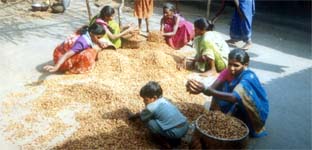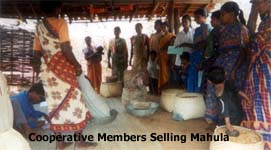Tribal Women United in Cooperatives
Tribals are exploited. Women are also exploited. But tribal women can unite to fight exploitation by following a self-reliant economic activity, may sound incredible but it is now a reality. It all started when hundreds of residents of Tamperkela, Madalia and Tumbei villages of Tamperkela Panchayat under Gurundia Block of Sundergarh District in a meeting held on 24th February 2003 decided to form a self-reliant cooperative consisting of only women members chosen from each family.
These women were living on the sale of non-timber forest produce, they procured from the adjacent forests. That is, members of the Cooperative were necessarily the procurers of Mahua. The name given to such formation was Banapriya Primary Women Cooperative Limited, Tamperkela. Next day, in the same way was formed Banajiban Primary Women Cooperative Limited, Burda by the people of Jarda Panchayat of the same Tamperkela block. Mahua season was nearing was nearing then.. So the members of the Cooperatives decided to begin the activity of the Cooperatives with the collection of Mahua and trading in it. They entrusted their respective Boards of Directors (which were adhoc then) the responsibility of laying down the trade policy of Mahua. It may be mentioned that the members of the Board are from amongst the general members only but they are called Directors of the Primary Cooperatives. It was decided that all the members of the Cooperative would deposit Mahua, procured from the forest, in the collection centres, decided by the Board and they would receive the price for it only after the sale of Mahua. Till the sale of Mahua materialise, how they would manage their family? After all they are very poor and needy people. The respective Boards therefore decided that at the time of depositing the procured Mahua, some advance against such deposit could be provided according to their need. While taking such decision, two important questions were raised namely, i Wherefrom the money to be paid in advance would come?
To find solution to these questions a combined meeting of the Boards of both Banapriya Primary Women’s Cooperative and Banajiban Primary Women’s Cooperative was convened on 28th February 2003. They decided the necessity of the formation of an apex body with both of them as members to begin with. Thus was formed Banaja Banijya Sangha with headquarter. The Banagiri Primary Women’s Cooperative, which was formed by the women of Salebhadi Panchayat of Sambalpur district on 23rd April 2003 became its third member. Since then Banaja Banijya Sangha has not looked back. Its membership grew over time and at present there are ten Primary Women’s Cooperatives as its members whereas total number of members of these primary cooperatives is about 800. Its operation spreads over 40 villages of 10-Gram Panchayats under Gurundia block of Sundargarh district, Kuchinda and Jamankira block of Sambalpur District. Five primary cooperatives have been so far registered under Orissa Self-help Cooperative Act 2001. Mahua no more remains the only commodity for trade for these Primary Women’s Cooperatives. Banaja Banijya Sangha and its member cooperatives now also carry trading in other non-timber forest products (NTFP) like Char seed, Tamarind, Sal leaf plates and Siali leaves. And it is carried out in a systematic way following the procedure as described below. Formulation of Procurement policy
Before entering into any trade the Board of Directors (BoD) of primary cooperatives prepare a draft commodity specific procurement policy, which contains provisions related to grades, quality parameters, quality testing procedure, pricing, storage and role & responsibility for each section. This draft is prepared on the basis of general procurement policy provisions mentioned in the Annual Action Plan. The drafts prepared by the member cooperatives are discussed and finalised at the Sangha BoD, and then approved with cooperatives’ specific arrangements at the BoD of the primary cooperatives. Physical & Financial planning & Arrangements Before any business, the primary cooperatives prepare business projections detailing pooling targets and working capital required for the purpose. Such reports along with a formal application are submitted by each primary cooperative to the Sangha for arrangement of working capital. These applications along with the reports on projections, targets and working capital requirements are then compiled at the Sangha level and final business plan of the Sangha is prepared. However this is revised from time to time according to the business trends. On the basis of procurement policy and business plan the BoD of each cooperative makes necessary arrangements as regards pooling and storage. This includes arranging weighing set, go-down, protective measures for safe storage, bags etc.
As the Sangha is responsible for marketing of the commodities of member cooperatives, it looks for proper market linkages. Once the market linkage are established the member cooperatives are advised to transfer their stock to specified delivery points which is then sold to the trader. The Sangha carries out all formalities in this context.
In the last two years the achievement of these Cooperatives and the Sangha has been quite encouraging. The members have been getting right price for their procured commodities and without any fluctuation. There has been per capita annual increase of Rs.600/- in the earnings of the members. The Directors of the Board are being given training on the management of the Cooperatives. Over and above the members of these cooperatives who themselves are the procurers of the NTFPs have been spared of the menace of middlemen. The increase in the number of primary Cooperatives under the aegis of Banaja Banijya Sangha indicates the growing confidence of the tribal women in managing their economy through cooperatives and in effect annulling their exploitation. The formation of primary cooperatives follows a formal route in the light of The Orissa Self-help Cooperative Act, 2001 as it would help the registration of the Cooperative under the Act. The major task is to prepare a detailed Article of Association (AoA) for proper management of the cooperative. In doing this, five registered cooperatives are involved and AoA development workshops are organised. After good deal of deliberations, wherein participate the women interested to form a cooperative, the draft AoA is prepared. But this draft prepared in workshop is placed in the village and hamlet level meetings and discussed thoroughly. The suggestion, if any, is incorporated in the draft. Finalisation of the draft takes place following further discussion in a workshop organised at individual cooperative level in the presence of all its members. Such finalisation is followed by the meeting of the founder members or the promoters of the Cooperative where in this AoA is approved and resolution for the registration of the Cooperative is taken. It is important to note that such cooperatives by tribal women does not accept one as its member who is not directly involved in the collection of NFTPs. Nothing is imposed on them during the formation of the cooperative. These cooperatives are genuinely by them, for them and of them, democratic to the core. It is indeed a unique experiment and serves as an example of spontaneous unfolding of the latent potential of much ignored tribal women striving for creating for them a genuine self-reliant economy. The prospect for setting up primary cooperatives looks quite bright. At least fifty cooperatives can be set up which can decisively influence the market. Along term plan is being envisaged to bring within the scope of the cooperatives other forms of livelihood besides the ones based on non-timber forest products. The ultimate objective is to make the cooperatives serve the basic needs of its members in a sustainable manner. |
Photographs :
References :







